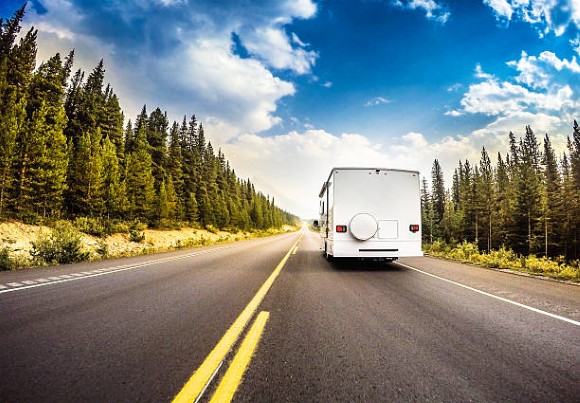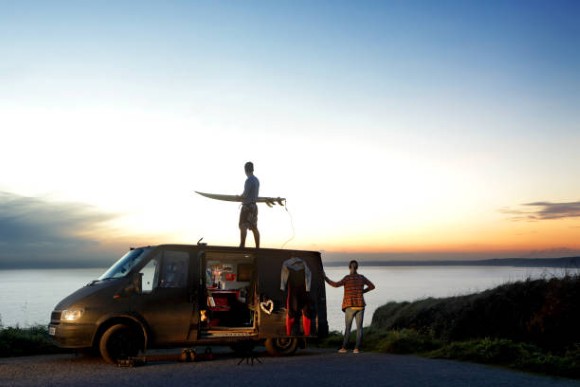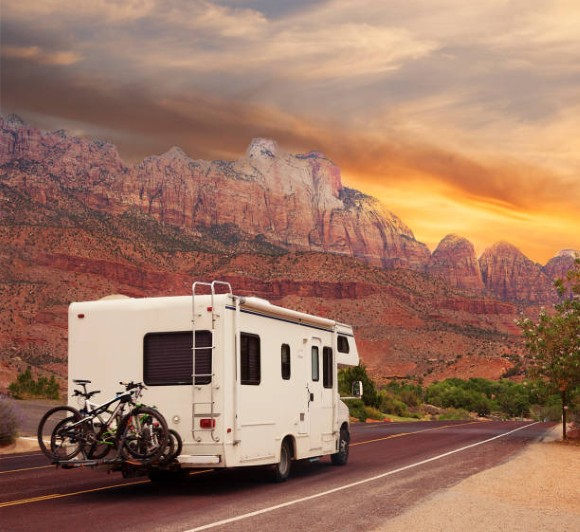|
It would be nice to wake up just a few steps away from the hike, paddle, or climb? You can also end the day by sitting around the campfire and sipping your preferred beverage instead of taking the long trip back to the backcountry. If this seems like a dream coming real, then an RV adventure may be in your future. An RV lets you stay longer and bring your home with you when on the road. It can seem daunting to make the switch from camping in a car or backpacking to traveling in an RV. With a little research and planning ahead, as well as the support of a growing RV community eager to share their enthusiasm and knowledge with you, it's easier than you think. Here are a few tips for planning that first trip. It would be great to to rise in the morning and be in the reach of your day's hike, paddle, or climb. And end your day sipping your preferred beverage around the campfire rather than taking the long drive out of the backcountry to get home? If this sounds like a dream come to life, then an RV trip could be on the cards for you in the near future. A vehicle allows you to remain longer and take your home with you on the road. It can seem daunting to transition from backpacking or car camping to RV travel. It's possible to make it a lot simpler by conducting some study and making plans ahead. Additionally, you can gain the support of an RV community who are eager to share their excitement and experience. Here are some suggestions to aid you in planning your first journey. RENTALSYou only have one choice when renting a vehicle: either drive it or tow. For your first time it is recommended to rent a Class A, B, C truck camper or camper van (all RVs that can be driven rather than tow) will be the most easy to maneuver and to rent. You can rent and tow a trailer when you have an SUV or a truck that has towing capabilities. With this question answered you can narrow your search by looking for local RV dealers who offer rentals and rental websites like Outdoorsy, and Cruise America. A good rental will include an extensive walk-through and orientation, as well as an operating manual to help you with any questions when you're on the road. The orientation should cover water, electric, sewer hook-ups, as well as appliances including heat, AC, fuel, propane, and anything else that you're not used to. ROUTE PLANNINGRV travel can be slower than an overnight road trip. Make sure to make overnight stops that are no further than 300 miles, or about four hours away. You will get more time to enjoy your stops, and stay in your RV for less time. It is important to find campsites that are easy to get to (preferably pull-through), have amenities such as showers, food service, and friendly staff. The KOA app is an excellent guide to campgrounds and solid support to help you plan your first trip. You can monitor the gas gauge, look out truck stops, and fill with approximately one quarter tank. This will provide you with plenty of room to pull your vehicle through, turning or backing it up, without worry about running out of gas. CAMP SET-UP and BREAK downThe most challenging task is likely to be making the camp. This is the reason why the importance of orientation is paramount. After parking and leveling your RV the water and electric (grey black, gray, and fresh) systems should be connected. If there are slides, you can extend them, flip over the refrigerator, then turn on the heat/AC to fully enjoy the creature luxury. It's time to take them off, and then enjoy. As you dismantle camp, be sure to go back and ensure that everything is properly packed. The last stop to make before leaving camp is the dump station, where you'll take out your black water tank, then you're back on the road. Make time to talk with fellow RVers at your campsite and observe the various ways people set up camp. Every person has a story or tip that can save you time and make your travel easier. There's a warm and supportive community that wants you to love RV travel just as much as they do. WHAT TO PACKThis is an easy one, since your RV packing list will look similar to the one you carry for backpacking or car camping. Include essentials such as wicking, warmth, and rain-resistant layers of clothing and equipment for adventure like a backpack as well as a first aid kit headlamp, and trail shoes. One of the great things about living in a RV is that you can bring some of those luxury items you usually put away at home, like towels and toiletries, your favorite meals, camping chairs and wood for the fire. You'll have more space to store things and spread them out more than you're used for in the tent. Reduce the frequent stops and stress of parking and navigating the parking lot of restaurants and gas stations by packing a cooler. Pet treats and water are recommended as well to ensure that everyone has the ability to eat on the road and ensure that truck stops don't take all day. THE RECAP IS ESSENTIALThere is nothing that can teach you more about RVing than taking a trip, so once you've returned at home, be sure to talk through what worked and what didn't work, as well as how you can make the next trip even better than the first. There will be a few more journeys before you're able to fully understand your vehicle and have your operating system in order, but you can adjust your plans to improve your favorite experiences and minimize anxiety.
1 Comment
If you are looking to get more in the open buying an RV is an excellent option. There are numerous options for RVs to fit diverse styles of life. But, it's simpler to select the best RV for your needs if you know what you are looking for. What should you consider when choosing which RV to purchase? Here are the five most important factors to take into consideration when choosing an RV. Types of RVsIt is essential to be familiar with the primary types of RVs for potential RV owners. They include motorhomes, camper vans, as well as fifth wheel. There are many types and it could get somewhat confusing to understand the meaning of all the different types, so we recommend checking out our complete overview of the major different types of RVs prior to going on. To make things easy to make things easier, there are two types of RVs you must be aware about immediately such as motorhomes and towable RVs. If you don't have a vehicle that can tow then you'll need to buy one or purchase a motorhome. Given the potential cost of upgrading your vehicle, it's definitely something to be considered in the beginning. Aims for a lifestyleWhen choosing an RV ask yourself what you intend to do with it and how often you plan to use it. For example, it doesn't make sense to buy a massive and luxurious fifth-wheel RV when you plan to use it once or twice a year to take short camping trips. An easy-to-store and mobile RV, such as a pop-up camper, would better suit your needs in this case. If you want an RV to use as a base for off-road excursions, you should consider the toy hauler option, which comes with a garage that can transport four-wheelers. An RV is in the end, a device. An RV is a device. Class B motorhomes, camper van or campervan could be the ideal choice when you want to take a long hike and then have somewhere to rest for the night, and use the toilet in the morning. Decide the function your RV will serve then choose an RV that best fulfills it. Not required amenitiesModern RVs can be extremely luxurious. It's not unusual to see Class A motorhomes as well as fifth-wheel RVs that have kitchens of a residential standard with king-sized beds, spacious walk-in showers, remote-controlled features comfortable seating arrangements and high-tech entertainment systems. There are options for you if aren't looking for luxury-on-the-go. Many RVs have a wide range of options in terms of floor plans, packages and other features. Certain of these features you might not need. In the end, the most well-equipped RVs tend to be the biggest and even if you don't have children to travel with, many of those features may become unnecessary. Although it's easy for RV owners to be excited about all the amazing toys they own but these toys could cost more than they're worth. Consider how you intend to use your RV and prioritize the features that you need for your lifestyle before adding the ones that seem like they'd be good to have every once in awhile. Your budget will be grateful. Budget and running expensesThe budget you have set could be the primary consideration when choosing an RV. RVs are an investment for the long term and require capital. It's no surprise that selecting the best RV, as with choosing the best vehicle, is affected by the amount of money you're willing to spend for one. An RV is more expensive than a car as it requires electricity and clean water. You also need to take into account storage options in the event that the recreational vehicle is not in use. The running expenses should be taken into consideration when deciding the amount you'll invest in your trip. It is better to rent an RV as an choice over buying one if you aren't planning to take frequent trips on the road. You will save money and get rid of the burden of purchasing an expensive car which you don't utilize enough. It's great but you don't need to own an RV to enjoy it.
Owning a house can be expensive and time-consuming. You have to worry about repairs, landscaping, and security. An RV offers the freedom to go anywhere you want, whenever you want. You're not tied down to one spot. Plus, an RV is perfect for adventure. You can explore different parts of the country or even the world. We've compiled a list of reasons why an RV is better than a house. Read on to learn more! What Is an RV?An RV is a recreational vehicle. RVs come in all shapes and sizes, from small campervans to large motorhomes. They're equipped with all the amenities you need for a comfortable journey, including a kitchen, bedroom, bathroom, and living area. RVs are popular among retirees, families, and even young adults who enjoy road trips and camping. However, anyone can enjoy the benefits of owning an RV. What are The Advantages of Owning an RV?There are many benefits to owning an RV. Here are some of the most popular:
With an RV, you can go anywhere you want, whenever you want. You're not tied down to one location. This is perfect for retirees who want to travel the country or young adults who enjoy road trips. 2. Adventure:An RV is perfect for exploring different parts of the country or even the world. You can camp in national parks, visit different cities, and experience new cultures. 3. Affordable:RVs are often more affordable than houses. They're also cheaper to maintain and operate. 4. Convenient:RVs come with all the amenities you need for a comfortable journey, including a kitchen, bedroom, bathroom, and living area. This makes them ideal for long road trips or camping trips. 5. Fun:Owning an RV is a fun and exciting experience. It's perfect for families or groups of friends who enjoy spending time together. Now that you know the advantages of owning an RV, you may be wondering if it's the right choice for you. Navigate to this site to find out additional reading on RV. Thinks to Consider Before Buying an RVIf you're thinking about buying an RV, there are a few things to consider first. Here are some important factors to keep in mind: Cost: RVs can be expensive, especially motorhomes. However, they're often cheaper than houses. You'll also save money on maintenance and operation costs. Storage: RVs require a lot of storage space. You'll need to find a place to park your RV when you're not using it. Time: RVs require a lot of time and effort to maintain. You'll need to clean it regularly and check for maintenance issues. Licensing: You'll need a special license to drive an RV. This can be difficult to obtain in some states. Experience: RVs can be difficult to drive, especially if you're not used to it. It's important to practice driving and parking before hitting the open road. You should consider renting an RV if you are looking for a fun and exciting way to travel. Nevertheless, you must follow these things to consider before making your purchase. Final ThoughtsOwning an RV has many advantages. It's perfect for those who enjoy road trips, camping, or exploring different parts of the country. However, there are some things to consider before making your purchase, such as cost, storage, and time commitment. If you're up for the challenge, an RV can be a great addition to your life. |
|



